Cute actress Erika Glässner (1890-1959) starred as a 'backfisch' and later as a cheeky temptress in many German films of the silent era. From 1915 till 1952 she appeared in some 80 films.
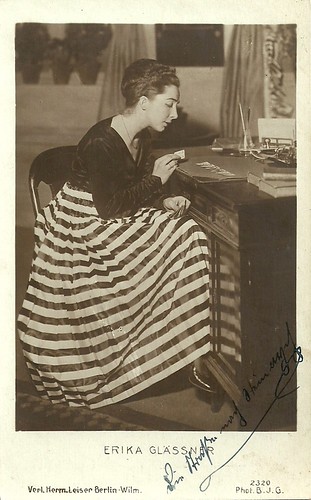
German postcard by Verlag Hermann Leiser, Berlin, no. 2320. Photo: B.J.G.
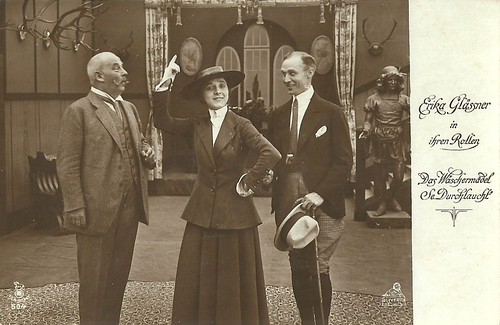
German postcard by Rotophot in the Film Sterne Series, no. 504. Photo: Oliver Film. Publicity still for Das Wäschermädel Seiner Durchlaucht/The Washer Girl of His Highness (Danny Kaden, 1917).
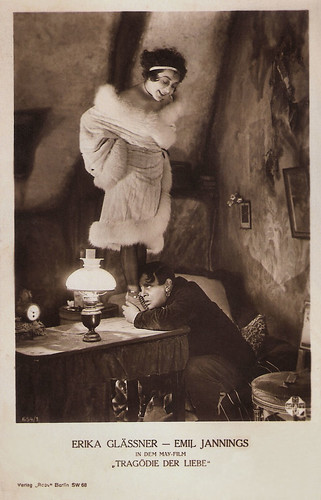
German postcard by Ross Verlag, no. 654/1. Photo: May Film. Erika Glässner and Emil Jannings in Tragödie der Liebe/The Tragedy of Love (Joe May, 1923).
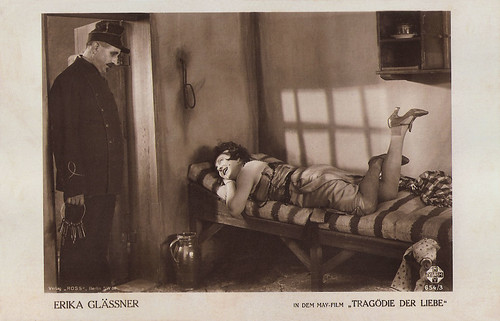
German postcard by Ross Verlag, no. 654/3. Photo: May Film. Erika Glässner in Tragödie der Liebe/The Tragedy of Love (Joe May, 1923).
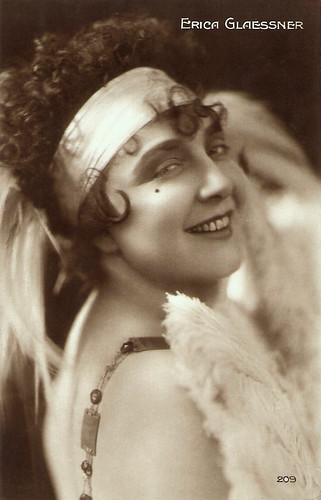
French postcard, no. 209. Photo: publicity still for Tragödie der Liebe/The Tragedy of Love (Joe May, 1923).
Marie Johanna Erika Glässner (Glaessner) was born in Erfurt, Germany in 1890. She was the daughter of the painter Gottfried Glässner. Her brother was the opera singer Kurt Glässner. In her youth, she received ballet lessons. In 1910, she debuted as a dancer at the Stadttheater (City Theater) in Erfurt. In the following years, she had engagements as a dancer and actress in Olbernhau, Halberstadt and Frankfurt am Main. In 1914 she appeared for the first time on stage in Berlin at the Lustspielhaus (Comedy house). Several successful performances at cabarets and theatres followed.
From 1915 on Erika Glässner played supporting and leading roles in silent films. Her screen debut was in Der moderne Paris oder Der Herr Apotheker heiratet/The modern Paris, or Sir Pharmacist married (Heinrich Bolten-Baeckers, 1915). Her following films were the short Ein nettes Pflänzchen/A Cute Little Fraud (Paul Heidemann, 1916) and Werner Krafft (Carl Froelich, 1916) with Eduard von Winterstein.
In these years she mainly portrayed backfische (teenage girls) in such melodramas as Spiel im Spiel/Play within a play (Emmerich Hanus, 1916) with Friedrich Zelnik, Katinka (Emil Birron, Paul Otto, 1918), and Moral und Sinnlichkeit/Morality and Sensibility (Georg Jacoby, 1919) with Käthe Dorsch.
Opposite Hans Albers she starred in Aus eines Mannes Mädchenjahren/A Man's Girlhood (Karl Grune, Paul Legband, 1919). Reinhold Schünzel cast her next to Liane Haid as a maid in Der Roman eines Dienstmädchens/The Novel of a maid (Reinhold Schünzel, 1921).
During this period, she was often cast as the cheeky temptress, such as in Tragödie der Liebe/Love Tragedy (Joe May, 1923) in which she was the mistress of Emil Jannings. She played the title figure in Die Blumenfrau vom Potsdamer Platz/The Flower Lady from Potsdamer Platz (Jaap Speyer, 1925). In Kubinke, der Barbier, und die drei Dienstmädchen/Kubinke, the barber, and The three maids (Carl Boese, 1926) her co-star was Werner Fuetterer, and in Gerhard Lamprecht's drama Menschen untereinander/Among people (Gerhard Lamprecht, 1926) the star was Alfred Abel.
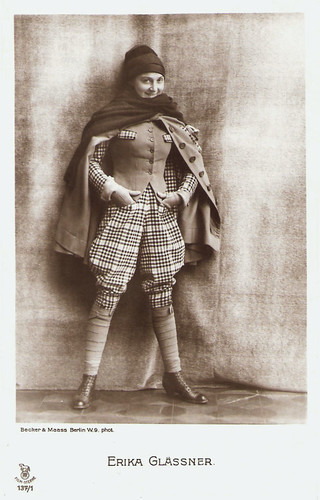
German postcard by Rotophot in the Film Sterne Series, no. 137/1. Photo: Becker & Maass, Berlin.
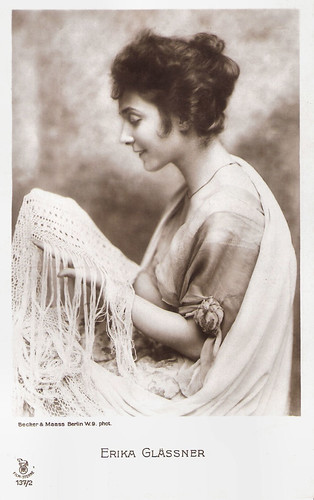
German postcard by Rotophot. in the Film Sterne Series, no. 137/2. Photo: Becker & Maass, Berlin.
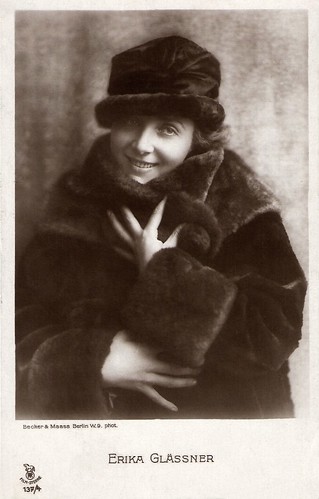
German postcard by Rotophot. in the Film Sterne Series, no. 137/4. Photo: Becker & Maass, Berlin.

German postcard by Rotophot. in the Film Sterne Series, no. 203/1. Photo: Becker & Maass, Berlin.
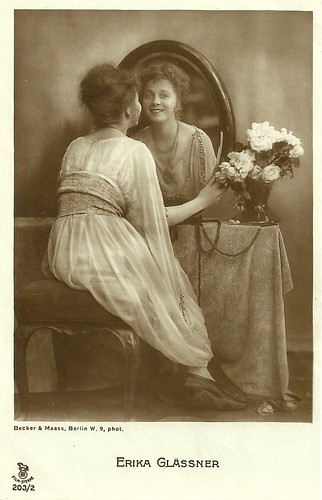
German postcard by Rotophot. in the Film Sterne series, no. 203/2. Photo: Becker & Maass, Berlin.
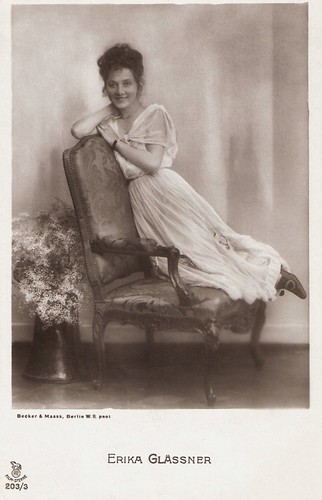
German postcard by Rotophot. in the Film Sterne series, no. 203/3. Photo: Becker & Maass, Berlin.
In 1926 Erika Glässner married the politician Arnold Kalle. Although her roles became smaller over the years, Glässner remained a busy film actress for a long time. She also continued to play in the theatre.
After the introduction of the sound film, she mainly portrayed such characters as strict aunts and mothers-in-law, or maids or wives. She played in the comedy Madame wünscht keine Kinder/Madame Does Not Want Any Children (Hans Steinhoff, 1933) with Liane Haid and Georg Alexander, and she appeared with Heinz Rühmann in Heinz im Mond/Heinz in the Moon (Robert A. Stemmle, 1934) as the wife of Oskar Sima, who mimed a stockbroker.
Erich Engel gave her a small role in his adaptation of George Bernard Shaw's Pygmalion (Erich Engel, 1935) with Gustaf Gründgens and Jenny Jugo, and in Der Müde Theodor/The Tired Theodore (Veit Harlan, 1936) she was the wife of the protagonist, played by the Bavarian comedian Weiss-Ferdl.
After the Second World War, she had her last film work in two productions of the East-German DEFA studios. In the literary adaptations Corinna Schmidt (Arthur Pohl, 1951) and Karriere in Paris/Career in Paris (Hans-Georg Rudolph, Georg C. Klaren, 1952) she appeared as a distinguished lady from the upper class.
After the death of her husband, she retired from the cinema. In 1956 she left the former DDR (East Germany) and went to live in Giessen, Germany. There Erika Glässner committed suicide in 1959. She was 69. The media did not take notice of the death of the former film star.
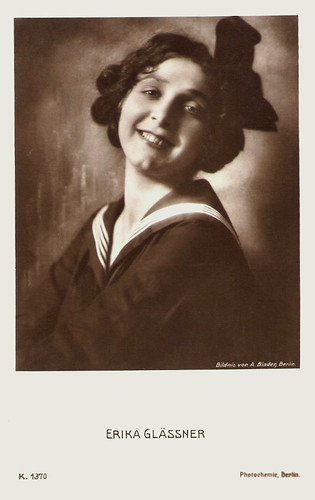
German postcard by Photochemie, no. K. 1370. Photo: Alex Binder, Berlin.
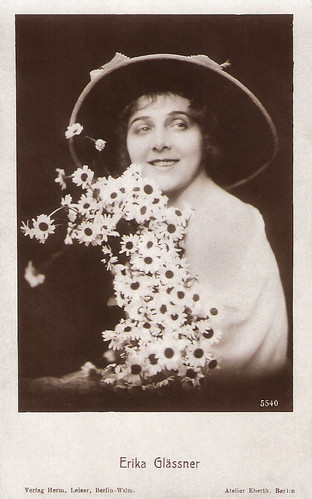
German postcard by Hermann Leiser, Berlin-Wilm, no. 5540. Photo: Atelier Eberth, Berlin.
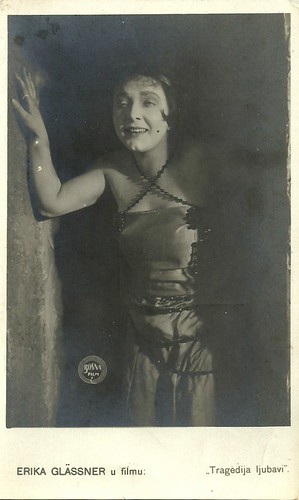
Yugoslavian postcard. Photo: Bosna Film. Publicity still for the German silent film Tragödie der Liebe/The Tragedy of Love (Joe May, 1923).
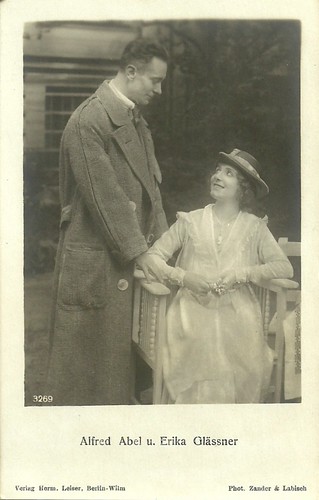
German postcard by Verlag Hermann Leiser, Berlin, no. 3269. Photo: Zander & Lubisch. Publicity still for Menschen untereinander/People to Each Other (Gerhard Lamprecht, 1926).
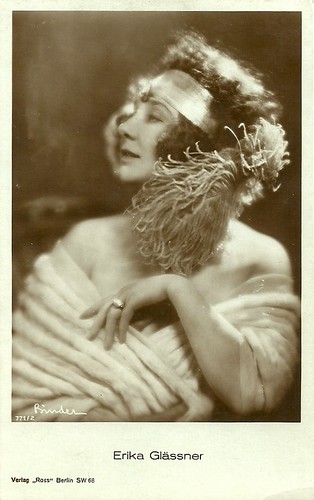
German postcard by Ross Verlag, no. 771/2, 1925-1926. Photo: Alex Binder.
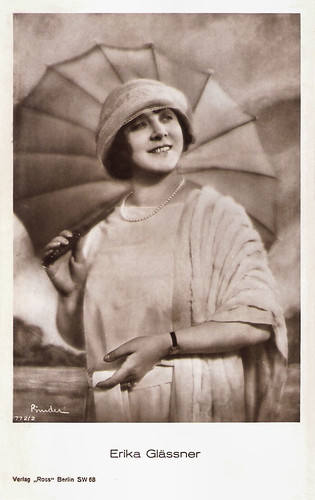
German postcard by Ross Verlag, no. 772/2, 1925-1926. Photo: Alex Binder.
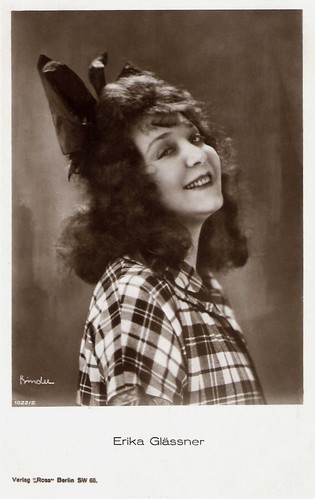
German postcard by Ross Verlag, no. 1022/2, 1927-1928. Photo: Alex Binder.
Sources: Stephanie D’heil (Steffi-line - German), Thomas Staedeli (Cyranos), DEFA Filmsterne (now defunct), Filmportal, Film-Zeit (now defunct), Wikipedia (German) and IMDb.
This post was last updated on 16 June 2024.

German postcard by Verlag Hermann Leiser, Berlin, no. 2320. Photo: B.J.G.

German postcard by Rotophot in the Film Sterne Series, no. 504. Photo: Oliver Film. Publicity still for Das Wäschermädel Seiner Durchlaucht/The Washer Girl of His Highness (Danny Kaden, 1917).

German postcard by Ross Verlag, no. 654/1. Photo: May Film. Erika Glässner and Emil Jannings in Tragödie der Liebe/The Tragedy of Love (Joe May, 1923).

German postcard by Ross Verlag, no. 654/3. Photo: May Film. Erika Glässner in Tragödie der Liebe/The Tragedy of Love (Joe May, 1923).

French postcard, no. 209. Photo: publicity still for Tragödie der Liebe/The Tragedy of Love (Joe May, 1923).
Backfische
Marie Johanna Erika Glässner (Glaessner) was born in Erfurt, Germany in 1890. She was the daughter of the painter Gottfried Glässner. Her brother was the opera singer Kurt Glässner. In her youth, she received ballet lessons. In 1910, she debuted as a dancer at the Stadttheater (City Theater) in Erfurt. In the following years, she had engagements as a dancer and actress in Olbernhau, Halberstadt and Frankfurt am Main. In 1914 she appeared for the first time on stage in Berlin at the Lustspielhaus (Comedy house). Several successful performances at cabarets and theatres followed.
From 1915 on Erika Glässner played supporting and leading roles in silent films. Her screen debut was in Der moderne Paris oder Der Herr Apotheker heiratet/The modern Paris, or Sir Pharmacist married (Heinrich Bolten-Baeckers, 1915). Her following films were the short Ein nettes Pflänzchen/A Cute Little Fraud (Paul Heidemann, 1916) and Werner Krafft (Carl Froelich, 1916) with Eduard von Winterstein.
In these years she mainly portrayed backfische (teenage girls) in such melodramas as Spiel im Spiel/Play within a play (Emmerich Hanus, 1916) with Friedrich Zelnik, Katinka (Emil Birron, Paul Otto, 1918), and Moral und Sinnlichkeit/Morality and Sensibility (Georg Jacoby, 1919) with Käthe Dorsch.
Opposite Hans Albers she starred in Aus eines Mannes Mädchenjahren/A Man's Girlhood (Karl Grune, Paul Legband, 1919). Reinhold Schünzel cast her next to Liane Haid as a maid in Der Roman eines Dienstmädchens/The Novel of a maid (Reinhold Schünzel, 1921).
During this period, she was often cast as the cheeky temptress, such as in Tragödie der Liebe/Love Tragedy (Joe May, 1923) in which she was the mistress of Emil Jannings. She played the title figure in Die Blumenfrau vom Potsdamer Platz/The Flower Lady from Potsdamer Platz (Jaap Speyer, 1925). In Kubinke, der Barbier, und die drei Dienstmädchen/Kubinke, the barber, and The three maids (Carl Boese, 1926) her co-star was Werner Fuetterer, and in Gerhard Lamprecht's drama Menschen untereinander/Among people (Gerhard Lamprecht, 1926) the star was Alfred Abel.

German postcard by Rotophot in the Film Sterne Series, no. 137/1. Photo: Becker & Maass, Berlin.

German postcard by Rotophot. in the Film Sterne Series, no. 137/2. Photo: Becker & Maass, Berlin.

German postcard by Rotophot. in the Film Sterne Series, no. 137/4. Photo: Becker & Maass, Berlin.

German postcard by Rotophot. in the Film Sterne Series, no. 203/1. Photo: Becker & Maass, Berlin.

German postcard by Rotophot. in the Film Sterne series, no. 203/2. Photo: Becker & Maass, Berlin.

German postcard by Rotophot. in the Film Sterne series, no. 203/3. Photo: Becker & Maass, Berlin.
Strict aunts and mothers-in-law
In 1926 Erika Glässner married the politician Arnold Kalle. Although her roles became smaller over the years, Glässner remained a busy film actress for a long time. She also continued to play in the theatre.
After the introduction of the sound film, she mainly portrayed such characters as strict aunts and mothers-in-law, or maids or wives. She played in the comedy Madame wünscht keine Kinder/Madame Does Not Want Any Children (Hans Steinhoff, 1933) with Liane Haid and Georg Alexander, and she appeared with Heinz Rühmann in Heinz im Mond/Heinz in the Moon (Robert A. Stemmle, 1934) as the wife of Oskar Sima, who mimed a stockbroker.
Erich Engel gave her a small role in his adaptation of George Bernard Shaw's Pygmalion (Erich Engel, 1935) with Gustaf Gründgens and Jenny Jugo, and in Der Müde Theodor/The Tired Theodore (Veit Harlan, 1936) she was the wife of the protagonist, played by the Bavarian comedian Weiss-Ferdl.
After the Second World War, she had her last film work in two productions of the East-German DEFA studios. In the literary adaptations Corinna Schmidt (Arthur Pohl, 1951) and Karriere in Paris/Career in Paris (Hans-Georg Rudolph, Georg C. Klaren, 1952) she appeared as a distinguished lady from the upper class.
After the death of her husband, she retired from the cinema. In 1956 she left the former DDR (East Germany) and went to live in Giessen, Germany. There Erika Glässner committed suicide in 1959. She was 69. The media did not take notice of the death of the former film star.

German postcard by Photochemie, no. K. 1370. Photo: Alex Binder, Berlin.

German postcard by Hermann Leiser, Berlin-Wilm, no. 5540. Photo: Atelier Eberth, Berlin.

Yugoslavian postcard. Photo: Bosna Film. Publicity still for the German silent film Tragödie der Liebe/The Tragedy of Love (Joe May, 1923).

German postcard by Verlag Hermann Leiser, Berlin, no. 3269. Photo: Zander & Lubisch. Publicity still for Menschen untereinander/People to Each Other (Gerhard Lamprecht, 1926).

German postcard by Ross Verlag, no. 771/2, 1925-1926. Photo: Alex Binder.

German postcard by Ross Verlag, no. 772/2, 1925-1926. Photo: Alex Binder.

German postcard by Ross Verlag, no. 1022/2, 1927-1928. Photo: Alex Binder.
Sources: Stephanie D’heil (Steffi-line - German), Thomas Staedeli (Cyranos), DEFA Filmsterne (now defunct), Filmportal, Film-Zeit (now defunct), Wikipedia (German) and IMDb.
This post was last updated on 16 June 2024.
No comments:
Post a Comment